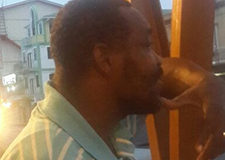By Dreylan Johnson and David Papannah
This week we asked the man/woman in the street their views on tattoos in the workplace and the military.
 Donetra Sullivan (student): `In my opinion, people have the right to self-expression and you know, a lot of people see tattoos as a way of doing such. It’s art for a lot of persons. But, for me, in terms of the military and public sectors, I don’t think that people should have tattoos that are visible. If you’re going to serve and you’re going to represent a certain standard then, if you do have tattoos, you should ensure that it’s always covered up. As an employer, I can’t say that you should turn away persons with tattoos, especially if it’s the military and if they want to serve, but at the same time, it shouldn’t be on places that you can see and it shouldn’t carry messages that are vulgar or lawless.’
Donetra Sullivan (student): `In my opinion, people have the right to self-expression and you know, a lot of people see tattoos as a way of doing such. It’s art for a lot of persons. But, for me, in terms of the military and public sectors, I don’t think that people should have tattoos that are visible. If you’re going to serve and you’re going to represent a certain standard then, if you do have tattoos, you should ensure that it’s always covered up. As an employer, I can’t say that you should turn away persons with tattoos, especially if it’s the military and if they want to serve, but at the same time, it shouldn’t be on places that you can see and it shouldn’t carry messages that are vulgar or lawless.’
 Jamain Hatton (student): `It’s unprofessional; I see it that way. I think it’s distasteful and it’s not what we would want to have in our military. I don’t want to contradict myself here, but I don’t think it’s a case where employers should know a person has a tattoo or not and it should be a big thing that prevents them from getting a job, but really, in the army where you’re going to see a tattoo, it speaks to distasteful character of an individual, but if it’s a tattoo somewhere that’s discreet, you’re free to do whatever you want with your body. People can say that tattoos can be for religious purposes, they can be spiritual, whatever it is—I think it’s distasteful, that’s just my preference. I think people in the public sector generally must be a good example to other people around, and persons joining the military should be of a standard that is worth emulating…’
Jamain Hatton (student): `It’s unprofessional; I see it that way. I think it’s distasteful and it’s not what we would want to have in our military. I don’t want to contradict myself here, but I don’t think it’s a case where employers should know a person has a tattoo or not and it should be a big thing that prevents them from getting a job, but really, in the army where you’re going to see a tattoo, it speaks to distasteful character of an individual, but if it’s a tattoo somewhere that’s discreet, you’re free to do whatever you want with your body. People can say that tattoos can be for religious purposes, they can be spiritual, whatever it is—I think it’s distasteful, that’s just my preference. I think people in the public sector generally must be a good example to other people around, and persons joining the military should be of a standard that is worth emulating…’
 Kenson Garraway (taxi driver): `I’m not just saying this because I have tattoos. Sometimes a person is well qualified, they have the talents and everything to get this job and just because of tattoos? You’re not supposed to reject somebody like that. So what will you leave them to do? Just go on the road and not do anything just because of a few tattoos? Up to last night a young man was here and he said he was trying to get into the GDF, so I told him about this guy upstairs and he went and tried to get the tattoo off, but you’re trying to get it off and it’s still leaving the mark. The ink won’t be there but the mark is there, so I don’t see the whole sense of having it removed if the mark is still going to be there. So for me, for all of those private owners and even to the government who are trying to keep back a young man from getting a job because of a tattoo, it’s totally wrong.’
Kenson Garraway (taxi driver): `I’m not just saying this because I have tattoos. Sometimes a person is well qualified, they have the talents and everything to get this job and just because of tattoos? You’re not supposed to reject somebody like that. So what will you leave them to do? Just go on the road and not do anything just because of a few tattoos? Up to last night a young man was here and he said he was trying to get into the GDF, so I told him about this guy upstairs and he went and tried to get the tattoo off, but you’re trying to get it off and it’s still leaving the mark. The ink won’t be there but the mark is there, so I don’t see the whole sense of having it removed if the mark is still going to be there. So for me, for all of those private owners and even to the government who are trying to keep back a young man from getting a job because of a tattoo, it’s totally wrong.’
 Keith Blackman (unemployed): `It’s good idea, because remember now, when you’re entering into the police force or the Guyana Defence Force, it’s a professional career job, and you should be respectable. So when persons see you out there they must have respect for you and must see you as a respectable individual. So I think it’s right indeed. Basically if it’s something very small and not on a visible part of their body, I think they should give them the opportunity, but if it’s too much and it’s all over their body where people can see it, it shouldn’t work. Concerning certain jobs, I can’t say in general with every job, I think a person should look at you and look at your appearance and tell the type of person you are, because, for me, if I’m going to join the bank or anywhere to work, I wouldn’t go with a lot of tattoos on my skin, because when persons look at me they’ll say this looks like this type of person and they wouldn’t really want to give me the opportunity to get the job. I think they look unprofessional, so I think maybe if someone wants to get a job, especially with certain qualifications and criteria, they should present themselves properly.’
Keith Blackman (unemployed): `It’s good idea, because remember now, when you’re entering into the police force or the Guyana Defence Force, it’s a professional career job, and you should be respectable. So when persons see you out there they must have respect for you and must see you as a respectable individual. So I think it’s right indeed. Basically if it’s something very small and not on a visible part of their body, I think they should give them the opportunity, but if it’s too much and it’s all over their body where people can see it, it shouldn’t work. Concerning certain jobs, I can’t say in general with every job, I think a person should look at you and look at your appearance and tell the type of person you are, because, for me, if I’m going to join the bank or anywhere to work, I wouldn’t go with a lot of tattoos on my skin, because when persons look at me they’ll say this looks like this type of person and they wouldn’t really want to give me the opportunity to get the job. I think they look unprofessional, so I think maybe if someone wants to get a job, especially with certain qualifications and criteria, they should present themselves properly.’
 Jonathon Hohenkirk (student): `I think employers should have the right to deny employment because of tattoos. At the end of the day the employees represent your company and if they don’t portray a good image then your company won’t have a good image. I like tattoos right, but don’t put them in places that would compromise your position on the job. Don’t put a big naked lady right there on your arm, because you know what society depicts as acceptable, why would you go and do something that’s not acceptable? If you have a simple, small tattoo like a sign or something, that shouldn’t have an influence.’
Jonathon Hohenkirk (student): `I think employers should have the right to deny employment because of tattoos. At the end of the day the employees represent your company and if they don’t portray a good image then your company won’t have a good image. I like tattoos right, but don’t put them in places that would compromise your position on the job. Don’t put a big naked lady right there on your arm, because you know what society depicts as acceptable, why would you go and do something that’s not acceptable? If you have a simple, small tattoo like a sign or something, that shouldn’t have an influence.’
 Dandre Tull (teacher): `I would not look at the tattoos, I would look at the person’s qualifications as I think that is the most important thing at the end of the day. They say a tattoo, once you put it on, it’s for life. I know we have all this different technology that would allow us to remove it but maybe that person was young and made a mistake, but they have the necessary requirements and qualifications for that particular job and they can function and function well. So they should not go as far as that. Maybe they can ask them to cover it up if that is the problem, if it’s bothering them. I don’t think they should go as far as to kick them out. As the saying goes, you don’t take bread out of people’s mouths. If the person is highly qualified and they can do the job and do it well, I see no problem. If there is a problem in terms of seeing it, they can be modest and they can cover it up. Right now we have a teacher at our school, she has a tattoo on her leg, but at our school we desperately need teachers and if she can fall in and handle the pace and deliver the curriculum well, why should a tattoo stop her? I understand in terms of professionalism but they can cover it up, it can be done and they can still function within society, they don’t have to be removed from society. Some people see them as a young people thing, some people see it as unprofessional but for me, it depends. If it’s something about love or peace or something—if it’s not vulgar. If it’s promoting a good message or is something as simple as a few hearts, it can pass. But if it’s going to be showing some woman naked in some kind of compromising position—once there’s vulgarity I don’t promote that. So what I’m saying is the most important thing is not focusing on the tattoo, it’s seeing who we have in society, what is their level of education and seeing how best we can get those persons in jobs, and remembering when we have them in jobs, they’re working for the benefit of the whole country. I’m looking at the bigger picture.’
Dandre Tull (teacher): `I would not look at the tattoos, I would look at the person’s qualifications as I think that is the most important thing at the end of the day. They say a tattoo, once you put it on, it’s for life. I know we have all this different technology that would allow us to remove it but maybe that person was young and made a mistake, but they have the necessary requirements and qualifications for that particular job and they can function and function well. So they should not go as far as that. Maybe they can ask them to cover it up if that is the problem, if it’s bothering them. I don’t think they should go as far as to kick them out. As the saying goes, you don’t take bread out of people’s mouths. If the person is highly qualified and they can do the job and do it well, I see no problem. If there is a problem in terms of seeing it, they can be modest and they can cover it up. Right now we have a teacher at our school, she has a tattoo on her leg, but at our school we desperately need teachers and if she can fall in and handle the pace and deliver the curriculum well, why should a tattoo stop her? I understand in terms of professionalism but they can cover it up, it can be done and they can still function within society, they don’t have to be removed from society. Some people see them as a young people thing, some people see it as unprofessional but for me, it depends. If it’s something about love or peace or something—if it’s not vulgar. If it’s promoting a good message or is something as simple as a few hearts, it can pass. But if it’s going to be showing some woman naked in some kind of compromising position—once there’s vulgarity I don’t promote that. So what I’m saying is the most important thing is not focusing on the tattoo, it’s seeing who we have in society, what is their level of education and seeing how best we can get those persons in jobs, and remembering when we have them in jobs, they’re working for the benefit of the whole country. I’m looking at the bigger picture.’
 Theresa Pierre: `They should be accepted, we need some more persons in the police force. Not because a person has a tattoo means they have a bad character. My mother has a tattoo and she’s not a bad woman, but it’s because of the fashion/style, which some people like and some people don’t. They are human beings and I feel that with the crime rate right now, if a person cannot find employment, they will find other means to get money. I don’t feel a tattoo should be a problem for somebody to get a job. If it’s too big then they should reject them. But if it’s small on their shoulder or foot or whatever it is, I think they should grant them the favour. If it’s big then it will bring a bad perception to the public because those in the police force are supposed to set an example to the public and if a person with a big tattoo approaches me, I would start watching him, and personally, I would be disrespectful to him.’
Theresa Pierre: `They should be accepted, we need some more persons in the police force. Not because a person has a tattoo means they have a bad character. My mother has a tattoo and she’s not a bad woman, but it’s because of the fashion/style, which some people like and some people don’t. They are human beings and I feel that with the crime rate right now, if a person cannot find employment, they will find other means to get money. I don’t feel a tattoo should be a problem for somebody to get a job. If it’s too big then they should reject them. But if it’s small on their shoulder or foot or whatever it is, I think they should grant them the favour. If it’s big then it will bring a bad perception to the public because those in the police force are supposed to set an example to the public and if a person with a big tattoo approaches me, I would start watching him, and personally, I would be disrespectful to him.’
 Ashley Ally (salesperson): `I don’t think that tattoos have anything to do with what the people from the GDF or police force are doing because anybody can have a tattoo, it doesn’t mean that they’re this kind of person or that kind of person. Just like how regular people who work at banks have tattoos and nobody says anything, nothing is wrong if police or a soldier or anybody from that sort of profession have tattoos. That’s not affecting their job, I don’t think it should be a problem at all.’
Ashley Ally (salesperson): `I don’t think that tattoos have anything to do with what the people from the GDF or police force are doing because anybody can have a tattoo, it doesn’t mean that they’re this kind of person or that kind of person. Just like how regular people who work at banks have tattoos and nobody says anything, nothing is wrong if police or a soldier or anybody from that sort of profession have tattoos. That’s not affecting their job, I don’t think it should be a problem at all.’
 John Holder (police officer): `I think they should consider keeping the policy in terms of entering the Guyana Police Force or the army, because of the image it creates. It’s not professional. It’s not only my personal perception. I understand that the GPF won’t employ those with visible tattoos, I don’t know about the ones that are hidden. I don’t think they would disqualify a person because it is on their back or on a place that a shirt could hide, but when it’s visible on the forearm or on the wrist, or on the face makes it even worse. I removed mine before I joined the force because I became a Christian. But remember you’re dealing with the public and tattoos paint an image of the individual. When an individual sees a person with a lot of tattoos on their skin, they would tend to stigmatize the individual in terms of, let’s say, a person has a tattoo so that’s a bad individual. A person without a tattoo, however, the person could relate to.’
John Holder (police officer): `I think they should consider keeping the policy in terms of entering the Guyana Police Force or the army, because of the image it creates. It’s not professional. It’s not only my personal perception. I understand that the GPF won’t employ those with visible tattoos, I don’t know about the ones that are hidden. I don’t think they would disqualify a person because it is on their back or on a place that a shirt could hide, but when it’s visible on the forearm or on the wrist, or on the face makes it even worse. I removed mine before I joined the force because I became a Christian. But remember you’re dealing with the public and tattoos paint an image of the individual. When an individual sees a person with a lot of tattoos on their skin, they would tend to stigmatize the individual in terms of, let’s say, a person has a tattoo so that’s a bad individual. A person without a tattoo, however, the person could relate to.’
 Carlos Barratt: `Generally speaking, everybody has their own choice and decision to make, nobody can make it for them, but I don’t like it. It all depends. If they have one it’s not a problem, but if they have a lot…but really it’s up to the management of the business to decide whether to hire or not. I think the policy is the right thing. Before, they never used to accept you with those things. Most persons you find when they get involved in situations involving crime, they’re quick to be identified.’
Carlos Barratt: `Generally speaking, everybody has their own choice and decision to make, nobody can make it for them, but I don’t like it. It all depends. If they have one it’s not a problem, but if they have a lot…but really it’s up to the management of the business to decide whether to hire or not. I think the policy is the right thing. Before, they never used to accept you with those things. Most persons you find when they get involved in situations involving crime, they’re quick to be identified.’










